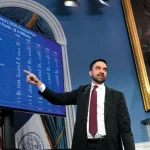

The Republican House majority is new, but its dilemma isn’t: trying to bring federal spending under control with most of Washington still run by Democrats without descending into chaos that will make fiscal responsibility look irresponsible.
The White House wasted no time on Tuesday making the case that the federal debt limit, which Treasury Secretary Janet Yellen has said will be reached later this week, should be raised without conditions and that to do otherwise is “brinksmanship that threatens the global economy.”
“This is not a plan,” White House press secretary Karine Jean-Pierre told reporters about the House Republicans’ proposal to prioritize federal payments to buy time for legislative negotiations. “It is a recipe for economic catastrophe.”
RECESSION WORRIES WHITE HOUSE IN 2023
President Joe Biden put it even more simply on Monday, calling Republicans “fiscally demented.”
“As President Biden has made clear, Congress must deal with the debt limit and must do so without conditions,” Jean-Pierre said near the top of Tuesday’s White House press briefing. “But congressional Republicans are threatening to hold the nation’s full faith and credit, a mandate of the Constitution, hostage to their demands to cut Social Security, to cut Medicare, and to cut Medicaid.”
This was one of Biden’s top lines of attack against Republicans ahead of the midterm elections last year — a GOP Congress will cut entitlement programs for retirees and crash the economy — and it worked well enough to keep the Republican House majority small and to make the Republican Senate minority smaller. So Biden’s team is repeating it, with a twist.
“Their latest idea is that rather than paying its bills, the United States should make payment to wealthy bondholders, including foreign investors, and stop payments for border security, food safety, nursing homes, school lunches, the [Federal Aviation Administration], drug enforcement, and other programs Americans rely on every single day,” Jean-Pierre said, adding, “They want to put wealthy bondholders over ordinary Americans who want safe food, safe skies, safe communities, and secure borders.”
Note that crime, illegal immigration, drug enforcement, and, lately, air travel have emerged as Biden administration vulnerabilities. Even if Biden doesn’t run again, the border is part of Vice President Kamala Harris’s portfolio, and the FAA is part of Transportation Secretary Pete Buttigieg’s. The White House is blaming those problems on congressional Republicans.
But Biden is also following a political playbook that allowed past Democratic presidents to recover from midterm losses and win reelection, through fiscal standoffs that lead to government shutdowns or the downgrading of the national credit rating. It could certainly make headlines about classified documents disappear.
These battles are central to the Democrats’ ability to cast Republicans as reckless and more interested in sowing chaos than governing, this time coming against the backdrop of the GOP’s recent 15-round fight to elect a House speaker in the first place.
Accusing Republicans of wanting to cut Social Security or Medicare has been a core part of the Democratic message since those programs were created. This has in turn made entitlement reforms unpalatable despite abortive attempts under President George W. Bush and in the budgets advanced by then-House Speaker Paul Ryan (R-WI).
Democrats took the Senate in 1986 after the first Republican majority since the 1950s following legislation to shore up Social Security’s shaky finances. Medicare reforms that House Republicans in 1995 promoted as performing a similar function for that program were described by Democrats as Medicare cuts to pay for tax cuts for the rich, helping President Bill Clinton win reelection two years after facing a midterm disaster.
Disagreements over spending and budget priorities led to the partial government shutdowns of 1995-96 — closures and work stoppages for which the Republicans were blamed, even though Clinton’s veto of a GOP funding bill triggered the first one.
President Barack Obama similarly squared off with the tea party-era Republican House on raising the debt ceiling when Biden was vice president. Obama compared his GOP interlocutors to hostage takers for pairing a debt limit extension with spending reforms.
Democrats frequently observe that Republican enthusiasm for spending cuts and balanced budgets does not necessarily continue during the terms of GOP presidents.
But the Republicans who won last year, like the tea partiers when Obama was in the White House, campaigned against high federal spending. They overtly pledged to put a brake on Biden’s trillion-dollar spending plans, and their anti-inflation messaging was an implicit argument for fiscal restraint.
Spending bills originate in the House, which Republicans now control, under the Constitution. But Democrats still hold the Senate and the presidency. House Speaker Kevin McCarthy (R-CA) leads a slender majority, with the most conservative and least compromising factions holding the balance of power.
Republicans can claim to have a mandate to fight Democratic spending fueling the inflationary fire. But many eschewed specific spending cuts on the campaign trail, and some of the new populists are more willing to use government power than the old-guard conservatives they regard as too libertarian economically.
CLICK HERE TO READ MORE FROM THE WASHINGTON EXAMINER
Gridlock can by itself slow down government growth, and congressional Republicans did in 2011 extract spending concessions from Obama in the sequestration deal, albeit at great political cost. But there are many roadblocks ahead of the new majority as it enters the debt ceiling fight on Thursday.
Biden isn’t planning on making their path any easier.







